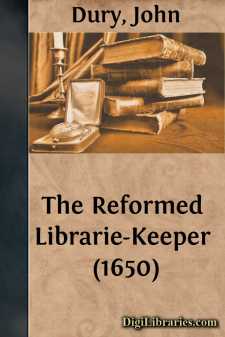Categories
- Antiques & Collectibles 13
- Architecture 36
- Art 48
- Bibles 22
- Biography & Autobiography 813
- Body, Mind & Spirit 142
- Business & Economics 28
- Children's Books 14
- Children's Fiction 11
- Computers 4
- Cooking 94
- Crafts & Hobbies 4
- Drama 346
- Education 46
- Family & Relationships 57
- Fiction 11829
- Games 19
- Gardening 17
- Health & Fitness 34
- History 1377
- House & Home 1
- Humor 147
- Juvenile Fiction 1873
- Juvenile Nonfiction 202
- Language Arts & Disciplines 88
- Law 16
- Literary Collections 686
- Literary Criticism 179
- Mathematics 13
- Medical 41
- Music 40
- Nature 179
- Non-Classifiable 1768
- Performing Arts 7
- Periodicals 1453
- Philosophy 64
- Photography 2
- Poetry 896
- Political Science 203
- Psychology 42
- Reference 154
- Religion 513
- Science 126
- Self-Help 84
- Social Science 81
- Sports & Recreation 34
- Study Aids 3
- Technology & Engineering 59
- Transportation 23
- Travel 463
- True Crime 29
The Reformed Librarie-Keeper (1650)
by: John Dury
Categories:
Description:
Excerpt
INTRODUCTION
This work, with its quaint sentiments and its grim picture of what librarians were like in the mid-seventeenth century, is more than a curiosity. John Dury was a very important figure in the Puritan Revolution, offering proposal after proposal to prepare England for its role in the millennium. The Reformed Librarie-Keeper is an integral part of that preparation. To appreciate it one must look at it in terms of the plans of Dury and his associates, Samuel Hartlib and Johann Amos Comenius, to reform the intellectual institutions of England so that the prophecies in the books of Daniel and Revelation could be fulfilled there.
John Dury (1596-1680), the son of a Scottish Puritan, was raised in Holland.[1] He studied at the University of Leiden, then at the French Reformed seminaries at Sedan and Leiden, and later at Oxford. He was ordained a Protestant minister and served first at Cologne and then at the English church in the West Prussian city of Elbing. There he came in contact with Samuel Hartlib (?-1662), a merchant, who was to devote himself to many religious and scientific projects in England, and with Johann Amos Comenius (1592-1670), the leader of the Moravian Brethren, as well as with other great educational reformers of the Continent. The three of them shared a common vision—that the advancement of knowledge, the purification of the Christian churches, and the impending conversion of the Jews were all antecedent steps to the commencement in the foreseeable future of the millennium, the thousand-year reign of Christ on earth. They saw the struggles of the Thirty Years' War and the religious conflict in England as part of their development of providential history.
In terms of their common vision, each of them strove during the decade 1630-40 to help the world prepare for the great events to come. Comenius started redoing the educational system through his textbooks and set forth plans for attaining universal knowledge. Hartlib moved from Germany to England, where he became a central organizing figure in both the nascent scientific world and the theological world. He was in contact with a wide variety of intellectuals and brought their ideas together. (For instance, he apprised Dury of the millenarian theory of Joseph Mede, which was to be so influential in the Puritan Revolution, and he spread Comenius's ideas in England.) Dury devoted himself principally to trying to unite all of the Protestant churches in Europe and to this end began his peregrinations from Sweden and Germany to Holland, Switzerland, France, and England. These travels were to continue throughout the rest of his life, as he tried to negotiate an agreement on the essentials of Christianity in preparation for Jesus' return.
In 1640, as the Puritan Revolution began, Hartlib, Comenius, and Dury saw the developments in England as the opportunity to put their scientific-religious plans into effect. They joined together in London in 1641 and, with strong support, offered proposals to prepare England for the millennium....


